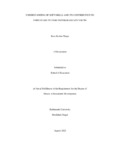
Please use this identifier to cite or link to this item:
https://hdl.handle.net/20.500.14301/138| Title: | UNDERSTANDING OF SOFT SKILLS AND ITS CONTRIBUTION TO EMPLOYABILITY FOR UNDERGRADUATE YOUTH |
| Authors: | Ram Keshar Thapa, Ram Keshar |
| Citation: | Thapa,R.K.(2022).Understanding of soft skills and Its contribution to employability for undergraduate youth. |
| Issue Date: | Aug-2022 |
| Publisher: | Kathmandu University School of Education |
| Department: | DODE |
| Level: | Masters |
| Program: | KUMSD |
| Abstract: | Soft Skills are the basic traits of humans that help to develop the ways of human interaction and the way we work. Soft skills among youths are not able to develop by education system even our schools and colleges. Schools and colleges focus on hard skills (subjective matter) rather than soft skills. As a result, undergraduates failed to get job offers in the job market. This situation has created a gap between job seekers and job providers. Connecting it, the major goal of my research is to uncover the experience of the undergraduate youths on various ways of learning soft skills. Further, I studied how they relate its contribution to employability. I employed social constructivist theory to learn about the ways of learning soft skills and human capital theory to learn about the contribution of soft skill to develop employability. To find the ways of learning soft skills and its contribution to employability for the undergraduate youth, I have designed research questions so, that I could explore their experience regarding the ways of learning soft skills and II its contribution to employability. In this research, I have used interpretative research paradigm and narrative inquiry as a research design. For achieving these purposes, I have collected the experiences and stories of five participants who are the undergraduate science students from Tri-Chandra College. I employed in depth interview to find the experiences of my participants. It was done virtually through zoom, Google meet and phone calls. The interview was recorded, and virtual interview notes were taken. Interesting elements in the interview process was observed and noted. The information was then read and re-read to find out common patterns across the data set. Different themes were generated, and the themes were narrated in the chapters. From the narration of my participants, I found that youth knows about the basics of soft skills. They know the basic soft skills which are communication, creativity, collaboration and critical thinking. They explained multiple ways of learning of soft skills which included structured and unstructured ways of learning. They stated that there is no specific place to learn soft skills. They stated that individual, family, community and school are the places to learn soft skills. They explained that the soft skills can be developed through trainings, internships and workshops. They also explained the importance of extracurricular activities to boost soft skills. Further, role models, mentors and seniors can also transfer the soft skills to their students. Schools and colleges, help to develop soft skills to their students through project based learning, oral presentations, discussions, reflections etc. Nowadays, the digital literacy has added to uplift soft skills. Using internet and technology like laptops, mobile has created an easy access to vast source of knowledge. From such knowledge, youths are being able to learn soft skills. |
| URI: | https://hdl.handle.net/20.500.14301/138 |
| Appears in Collections: | Research Project |
Files in This Item:
| File | Description | Size | Format | |
|---|---|---|---|---|
| Dissertation_Ram Keshar Thapa_APA_Reviewed.pdf | 830.91 kB | Adobe PDF |  View/Open |
Items in DSpace are protected by copyright, with all rights reserved, unless otherwise indicated.